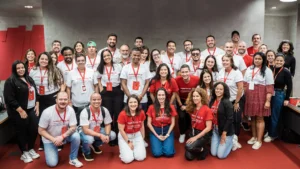In an interview, iFood's PR manager, Manuela Cherobim, talks about how to use data to obtain the best results for the business
O iFood News launch a series of four videos in which iFood executives explain how the concepts of New Economy are present in the strategies of different areas of iFood, such as communication, people management, growth and public policies.
In the area of Public Relations, Manuela Cherobim, PR manager at iFood, will speak. In her video, she explains what changes in this area in companies like iFood and how it is done data-driven communication.
In an interview with iFood News, Manuela talks about the topic and shows the results that this strategy brings to the reputation of companies — read more below.
iFN: What is different about PR in the New Economy?
Manuela: I think the main point is the use of data. New Economy companies rely on data to guide their strategies, to understand the best way and the best time to communicate with different audiences and also to measure the effectiveness of communication actions.
With the information we gathered, we were able to bring customized angles to understand the agenda, we understand which information is most relevant for each communication channel, for communication vehicles and for digital influencers. This way, we are able to deliver assertive messages according to each type of audience.
Today, the role of PR is not to take the company's internal issues and take them outside. It's understanding the external context, bringing this data inside and discussing what we're going to do about it. We literally need to know everything that is happening in Brazil and around the world and how this can relate to our business or ecosystem.
iFN: How is this data used in PR?
Manuela: The use of data is essential for the PR area to understand how it can engage and communicate with external audiences. iFood has tools that identify how the main topics related to its ecosystem are being discussed and cross-references this information with what is being said on social media.
The PR team evaluates this data daily to get an overview of what is happening in our sector, outside of it, in the press and on social media. When we have something really cool to communicate, we first understand the external temperature and then speak at the right time. If a war has started, for example, this is not the time to launch a major product because people are worried about macro issues, which ends up greatly reducing the visibility of the launch.
In this case, we can even hold the agenda to wait for a more suitable moment. But, if this is not possible, we change the strategy based on data to find the dissemination channel where the topic can gain relevance even at a critical global moment.
Following what will be the topic, the PR area prepares to weave its own narrative, not only in moments of crisis, but in positive ones as well. If the topic of sustainability is gaining momentum on the networks, we seek to understand how we can surf this wave and show what incredible things we are doing in sustainability. It's practically a Stock Exchange, except, in this case, an exchange of ups and downs in content.
iFN: In the New Economy, how strategic is PR for a company?
Manuela: A lot. PR takes advantage of digital tools that are important for the company's results, especially at this time when we live in the reputation economy. An example: today we know that Generation Z highly values social responsibility. If we do not understand this type of data and do not incorporate this value into the company's purpose, it will be doomed to failure.
Based on the data, this RP 4.0 can be more assertive and boost the business. Understanding the public and their values, knowing what the outside temperature is, we know what can be decisive at the time of purchase. That's why PR now sits at the table with leadership to discuss business strategies.
iFN: How does this improve the company's reputation?
Manuela: During the Covid-19 pandemic, it became very clear that truthful communication became very valuable, and this impacts the company's reputation. At the beginning of the pandemic, the tone of our communication was super fun, but we quickly realized that this wasn't the type of content people wanted because we were all worried about what was happening.
Insisting on this fun tone no longer made sense, the time was for sobriety and information about the pandemic. So we started to understand, by doing tests on social media and promoting conversations with journalists, what people expected to know about iFood.
Our business is new, a lot of people don't understand what it is gig economy and how iFood operates, which is a Brazilian technology company with 6,000 employees and the impact we have. If we don't communicate well, people won't know what we do, they will believe in assumptions.
When PR sits at the table with leadership to define strategies, communication is taken to another level. In 2021, in the evaluation made by journalists, iFood rose 41 positions in the Merco ranking of company reputation: from 48O place, went to 7O, and came first in our sector, e-commerce.
In the overall ranking, the iFood ranked 18thO place and rose 17 positions compared to 2020. This is the result of all this work on understanding channels and the approach we made with journalists and influencers, sending clear and informative messages about the business.


